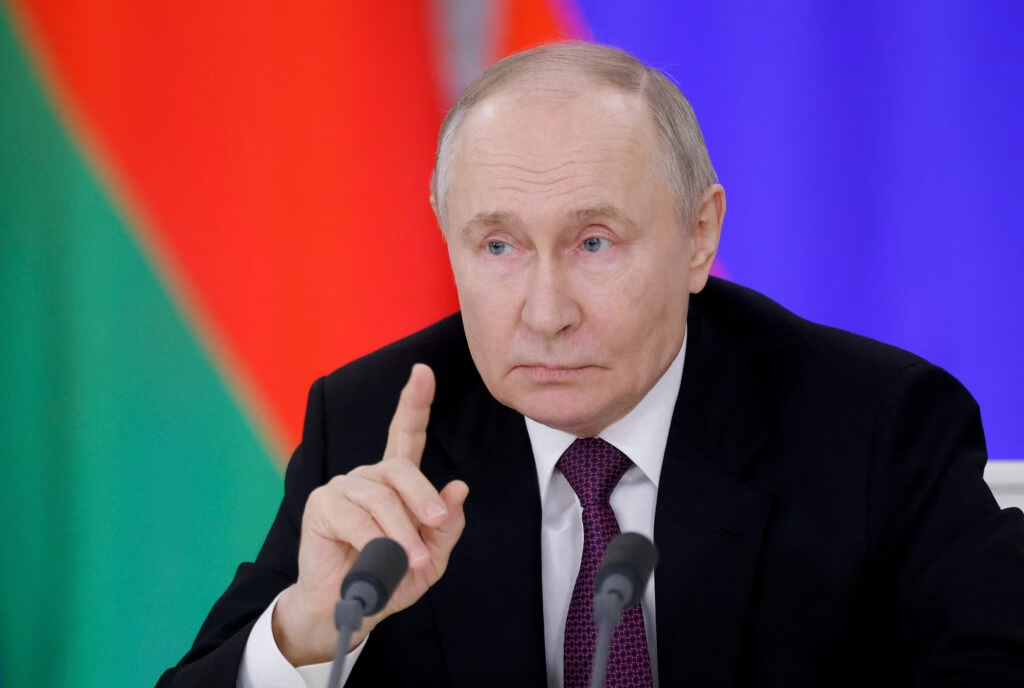Russia’s Conditional Support for Ukraine Ceasefire
Russian President Vladimir Putin has indicated conditional support for a United States-backed 30-day ceasefire in Ukraine, though he emphasized there are “nuances” requiring further negotiation. During a joint press conference in Moscow with Belarusian President Alexander Lukashenko, Putin appeared confident as President Donald Trump’s administration pushed for a swift resolution to the three-year conflict.
“We agree with the proposal for a cessation of hostilities,” Putin stated, “but we believe it should lead to long-term peace and address the root causes of this crisis.”
Current Military Situation
Russia has recently made significant battlefield advances, now controlling approximately 20% of Ukrainian territory, including Crimea, which was illegally annexed in 2014. The Kremlin’s forces, bolstered by thousands of North Korean troops, have also been successfully countering Ukrainian operations in Russia’s Kursk region.
The full-scale invasion began on February 24, 2022, under what Putin described as efforts for “denazification” and “demilitarization” of Ukraine—claims that have been widely rejected by the international community. Throughout the conflict, Putin has consistently portrayed Ukraine as the aggressor.
Analysis of Putin’s Response
The Institute for the Study of War (ISW) has characterized Putin’s recent remarks as a strategic attempt to reshape the ceasefire terms to benefit Russia. The U.S.-Ukraine proposal agreed upon Tuesday, calls for a renewable 30-day pause across all combat domains—land, air, and sea—to create space for peace negotiations.
Potential Diplomatic Developments
According to Russian state media, Steve Witkoff, Trump’s special envoy for the Middle East, was scheduled to meet with Putin to discuss the ceasefire proposal further. Putin himself suggested he might directly contact President Trump to address his concerns.
When asked about potential communication with Putin regarding the ceasefire, Trump responded, “Yeah, I’d love to meet with him or talk to them, but we have to get it over with fast.”
Concerns and Conditions
During the press conference, Putin expressed concerns that Ukraine might use any pause in fighting to rebuild its military capabilities. He suggested that Kyiv should be prohibited from:
- Rearming its forces
- Training additional troops
- Receiving weapons from Western allies
The ISW noted that Putin notably did not propose similar restrictions for Russian forces.
“Russian forces remain on the offensive,” the ISW stated. “Preventing Ukraine from reinforcing its military while allowing Russia to continue operations would ensure Moscow’s advantage and set the stage for renewed aggression.”
Ukraine’s Response
Ukrainian President Volodymyr Zelensky dismissed Putin’s remarks as “predictable and manipulative,” accusing the Russian leader of establishing unrealistic preconditions designed to undermine the ceasefire.
“Putin is afraid to tell President Trump directly that he wants to keep this war going,” Zelensky said. “So in Moscow, they’re surrounding the ceasefire with conditions designed to make it fail or drag it out indefinitely. Russia is the one stalling, the one refusing to be constructive. They need this war.”
Moving Forward: The Path to Peace
As diplomatic efforts continue, the international community watches closely to see whether these initial discussions can develop into meaningful progress toward ending the conflict. Experts from the Carnegie Endowment for International Peace suggest that successful negotiations will require compromise from all parties involved.
For those interested in supporting humanitarian efforts in Ukraine, organizations like the International Committee of the Red Cross and UNICEF continue to provide critical assistance to affected civilians.



